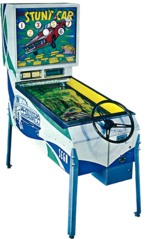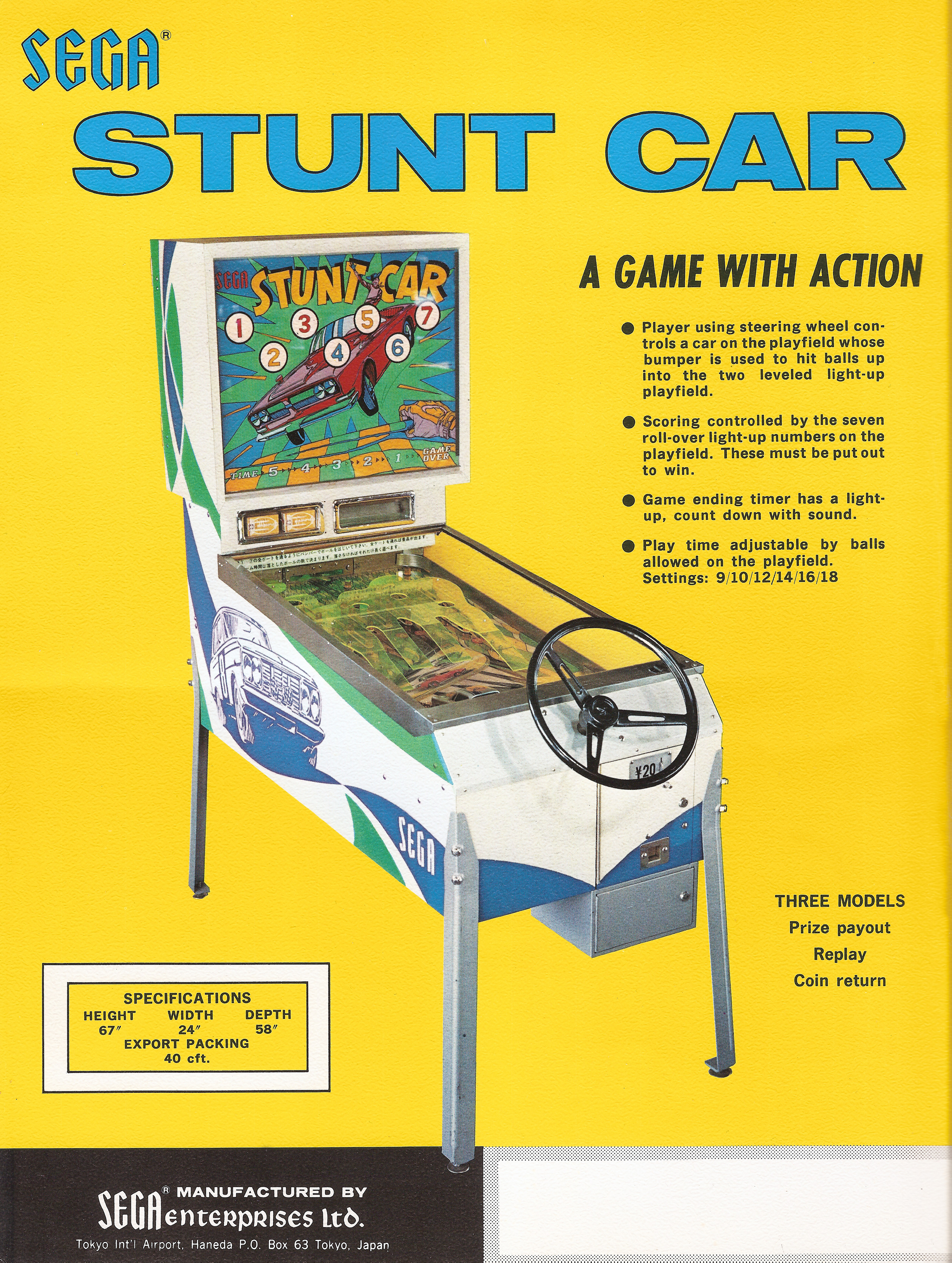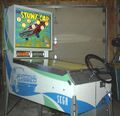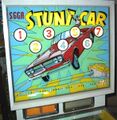Difference between revisions of "Stunt Car"
From Sega Retro
| Line 18: | Line 18: | ||
As the game is started, two balls (not pinballs, probably plastic) drop onto the playfield from the top. As the balls come down the playfield, trying to get them to drop in one of the seven playfield holes (the idea is to complete all seven holes in a given amount of time). The player steers the car back and forth (left and right) across the front of the playfield with the steering wheel, trying to hit the ball(s) with the front bumper of the car. The car's bumper acts as an automatic flipper to push the ball back up the playfield. As a ball enters a numbered hole, this number lights on the backglass, and the ball is recycled back to the top of the playfield where it comes down again (given there is time remaining in the game). Time left in the game is shown by lights on the backglass. | As the game is started, two balls (not pinballs, probably plastic) drop onto the playfield from the top. As the balls come down the playfield, trying to get them to drop in one of the seven playfield holes (the idea is to complete all seven holes in a given amount of time). The player steers the car back and forth (left and right) across the front of the playfield with the steering wheel, trying to hit the ball(s) with the front bumper of the car. The car's bumper acts as an automatic flipper to push the ball back up the playfield. As a ball enters a numbered hole, this number lights on the backglass, and the ball is recycled back to the top of the playfield where it comes down again (given there is time remaining in the game). Time left in the game is shown by lights on the backglass. | ||
| − | If all seven holes are completed in the given time, the game dispenses a small packet of crackers (or whatever treat is loaded in the game). Just below the backglass and above the playfield is the area where the crackers are held. The cabinet is formica with great car graphics. | + | If all seven holes are completed in the given time, the game dispenses a small packet of crackers (or whatever treat is loaded in the game). Just below the backglass and above the playfield is the area where the crackers are held. The cabinet is formica with great car graphics. The balls drop in a similar manner to [[pachinko]] machines. |
| − | The gameplay | + | The game's ball-bouncing gameplay was innovative,{{ref|https://www.sega.jp/history/arcade/product/11509/}} laying the foundations for the block-breaker genre of video games, including Ramtek's ''Clean Sweep'' (1974), Atari's ''[[wikipedia:Breakout (video game)|Breakout]]'' (1976),{{ref|https://arcadeheroes.com/2015/06/03/sega-turns-55-lets-remember-their-electromechanical-games/}} and [[Taito]]'s ''[[Arkanoid]]'' (1986). |
==Specifications== | ==Specifications== | ||
Revision as of 16:31, 17 November 2024

| |||||||||||||||||

| |||||||||||||||||
| Stunt Car | |||||||||||||||||
|---|---|---|---|---|---|---|---|---|---|---|---|---|---|---|---|---|---|
| System(s): Electro-mechanical arcade | |||||||||||||||||
| Publisher: Sega Enterprises, Ltd. | |||||||||||||||||
| Developer: Sega Enterprises, Ltd. | |||||||||||||||||
| Number of players: 1 | |||||||||||||||||
|
This teeny-tiny article needs some work. You can help us by expanding it.
Stunt Car is a 1970 electro-mechanical arcade game released by Sega Enterprises, Ltd.
As the game is started, two balls (not pinballs, probably plastic) drop onto the playfield from the top. As the balls come down the playfield, trying to get them to drop in one of the seven playfield holes (the idea is to complete all seven holes in a given amount of time). The player steers the car back and forth (left and right) across the front of the playfield with the steering wheel, trying to hit the ball(s) with the front bumper of the car. The car's bumper acts as an automatic flipper to push the ball back up the playfield. As a ball enters a numbered hole, this number lights on the backglass, and the ball is recycled back to the top of the playfield where it comes down again (given there is time remaining in the game). Time left in the game is shown by lights on the backglass.
If all seven holes are completed in the given time, the game dispenses a small packet of crackers (or whatever treat is loaded in the game). Just below the backglass and above the playfield is the area where the crackers are held. The cabinet is formica with great car graphics. The balls drop in a similar manner to pachinko machines.
The game's ball-bouncing gameplay was innovative,[1] laying the foundations for the block-breaker genre of video games, including Ramtek's Clean Sweep (1974), Atari's Breakout (1976),[6] and Taito's Arkanoid (1986).
Specifications
Dimensions
Promotional material
Photo gallery
References
- ↑ 1.0 1.1 https://www.sega.jp/history/arcade/product/11509/
- ↑ http://thetastates.com/eremeka/1970s.html (Wayback Machine: 2023-08-19 00:30)
- ↑ Cash Box (1971-07-17), page 94
- ↑ File:CashBox US 1973-08-18.pdf, page 54
- ↑ File:CashBox US 1971-01-09.pdf, page 32
- ↑ https://arcadeheroes.com/2015/06/03/sega-turns-55-lets-remember-their-electromechanical-games/










